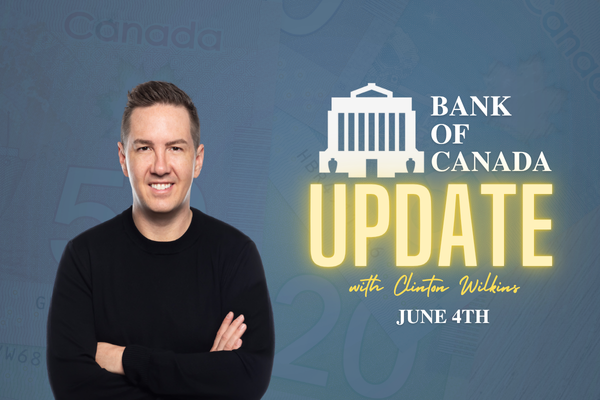Clinton Wilkins joins Todd Veinotte on 95.7 News Radio to discuss The Bank of Canada holding its key policy rate at 2.75%, marking the first pause after seven consecutive cuts.
Rick Howe: Talking about Financial Literacy Month
Talking Financial Literacy Month
Talking About Financial Literacy Month. Don’t feel like listening? Check out the audio transcript below.
This is a five minute business builder with Rick Howe, where your business comes first, on News 95.7.
Five-minute business builder with Rick Howe
Rick: [00:00:08] And from time to time on this show we welcome members of HRM’s business community to tell us more about themselves and the jobs that they do and today we welcome back Mortgage advisor Clinton Wilkins to the studio this afternoon. Hi Clinton.
Clinton: [00:00:20] How are you doing? Thanks for having me Rick.
Rick: [00:00:21] Well, thank you for coming back here again today. How are things going?
Clinton: [00:00:24] Just great.
Rick: [00:00:24] Good! You want to talk to us a bit about financial literacy month first here this morning. What is this all about?
Financial Literacy Month
Clinton: [00:00:30] You know what it’s November 1st and I think the first of the month is a great time to look at your finances. For us for our purview, you know, mortgage lending and household finances is one of the biggest pieces of people’s financial health. The mortgage is people’s biggest debt so I think that really getting the independent advice from a mortgage professional is great. I think November is a great time to take a look.
Rick: [00:00:53] All right and that mortgage professional would be someone like you for example.
Clinton: [00:00:56] Someone like me, or someone else that’s in someone’s community.
Rick: [00:00:59] So what can you help with, what can you provide people? I mean if I come to you with my questions, what is it you’re going to do for me here?
What do mortgage brokers help with?
Clinton: [00:01:04] I think for us our primary focus is the debt that’s attached to someone’s home. Whether it’s a condo or a house or another piece of real estate. You know, we look at what the best solution is for them over the long term and we look at their entire financial picture. You know, we’re looking at their unsecured debt and their assets to really give them the best advice moving forward. I find often times when clients come in to us they are really getting that unbiased advice because we’re not, you know, tied to one specific lender. We have access to many different lenders. We really can make a difference.
Rick: [00:01:34] The benefit of going to a mortgage broker is that you’re not tied to one bank or any bank. You could look and see with the best rates available are.
Clinton: [00:01:40] Exactly, we’re not biased to one lender we’re really biased to our clients.
Fixed and variable-rate mortgages
Rick: [00:01:44] Now, what’s the difference between a fixed rate and a variable, and what’s the benefit to one over the other.
Clinton: [00:01:49] Great question! There’s a lot of noise in the media right now around variable rate mortgages. As you know there was an increase to the prime rate here last week.
Rick: [00:01:56] Up a quarter point.
Clinton: [00:01:57] Up a quarter point, exactly. Historically people do better in a variable rate product but, we don’t want to have clients that are losing sleep at night. A fixed WILL be more expensive over a five year period of time. But, you know, there’s a cost to that peace of mind I think. Historically people do better in a variable, on average about 40 percent of Canadians are in a variable rate mortgage product.
Rick: [00:02:21] I think we’re in one of those here.
Clinton: [00:02:23] Probably a great, great call.
Future interest rates?
Rick: [00:02:24] Well, so far it’s been. But I mean, let’s look down the road a bit and what’s your expectation of future interest rate hikes?
Clinton: [00:02:30] Great question. You know, I’m not an economist, but I think over the next 18 to 24 months we’re going to see the Bank of Canada increase rates. I think we’re going to see some slow increases over the next period of time. But, the economists are thinking that there may be a recession come by 2020 which is going to drive down the inflation, which in turn will lower the interest rate. So I think anybody who’s in a variable rate mortgage product, you know, if they have a discount, you know, half a percent below prime or better I think staying in a variable is the way to go. There’s lots of variable rate mortgage products out there that you can get now at maybe prime minus 100. So if you have a variable rate, you know, at prime minus 10, 20, 30 it might make sense switching into a different lender a prime minus 100 or potentially into a fixed rate. But if you have a discount that’s deeper than prime minus 50. So 60, 70, 80, 90, 100. I think staying where you’re at makes sense and I think weathering that storm of the increases over the next 18 to 24 months is going to pay you dividends.
Reviewing your mortgage
Rick: [00:03:26] So we’re into a 25 year mortgage. How often should we be reviewing this mortgage?
Clinton: [00:03:30] Well, typically the average mortgage term in Canada is five years. So, people should be reviewing their mortgage, I think, at least once a year. Just looking at their financial outlook. A lot of things change in people’s lives. You know, they have babies, they get married, they get divorced, and lots of things change. So, I think that reviewing it once a year is really, you know, very prudent and I think November is a great time where it’s financial literacy. We’re putting out a lot of material on our website and our on our social media so they can certainly check us out and check out their unbiased mortgage professional in their market.
Rick: [00:04:01] I’m looking at some of these talking points, it says types of transactions purchase, refinance, or renewal.
Purchase, refinance, or renewal?
Clinton: [00:04:06] Yeah, so a lot of people think about reviewing their mortgage when they’re buying a home. Because, the majority of buyers get a mortgage. But, when your mortgage comes up for renewal I think it’s a great time to take a look and it may be a good time to think about transferring to a different lender. Because, like what I said before, a lot of mortgage lenders will give you a better rate as a new customer instead of an existing customer. A lot of lenders treat existing customers kind of like the cell phone companies. You know, they’re giving the new ones a better deal than the existing. And when you’re coming up close the renewal point people ask me like how soon should we start looking at it. I think six, four months before renewal you should really start taking a look. At that point it might make sense to do a refinance and access some of that equity that’s in your home. You know, in Canada you can refinance up to 80 percent of the market value. Sometimes that can make sense if clients are looking to tie in some unsecured debt, or do a renovation, or maybe for investment purposes. So I think seeking the advice of an unbiased mortgage professional at that time will certainly pay you dividends down the road.
In closing
Rick: [00:05:04] All right, good advice Clinton. Good to have you back here this afternoon.
Clinton: [00:05:07] Thanks for having me Rick and we’re going to be in on Saturday.
Rick: [00:05:09] That’s right, with Todd Veinotte.
Clinton: [00:05:10] Very exciting. So if anybody has any questions you can certainly phone in, we’re going to be on at 10:30.
Rick: [00:05:14] Excellent. Thank you. Thank you very much and see you in with Todd on Saturday at 10:30.
Clinton: [00:05:19] Perfect.
Have any questions? Get in touch with us!


